新概念英语第一册课后习题及答案:Lesson55-56
新概念一55-56练习详解

Lesson55二选择( B )1. He ______to do his lessons at eight every evening.A. is beginningB. beginsC. begin详解:他总是在每天晚上八点钟开始做他的功课。
Begin to do sth 开始做某事。
第三人称单数,谓语动词用第三人称单数。
( C )2. He usually _______TV on Sunday evening.A. watchB. watchingC. watches详解:他总是星期天的晚上看电视Usually提示使用一般现在时,主语提示谓语动词使用三单。
( B )3. ----Do you know Susan’s address?----Yes. She lives ____201 , Dongchang Road ,Liaocheng City.A. inB. atC. on详解:你知道苏珊的地址码?是的,她居住在liaocheng市东昌路201号。
小地点使用介词AT.(A )4. My brother _____ a lot. He is reading a new magazine now.A . reads B. read C. has read详解:我的兄弟经常阅读,他现在正在阅读一份新的杂志。
经常性习惯性的行为使用一般现在时。
主语三单提示谓语动词也使用三单。
( B )5. They usually have a football match ___Friday.A. inB. onC. to详解:他们通常在星期五看足球赛。
星期前用介词ON( B )6. He went there ______, not ______.A. on the car/by carB. on foot/ by carC. in his car/by his foot 详解:他总是走路去哪儿,而不是坐车。
新概念英语第一册lesson55-56(推荐完整)

housework n.家务
Do you often do housework at home? clean the floor / wash the dishes cook dinner
lunch 午饭 breakfast supper dinner(较正式,一般指晚宴) meal [mi:l] 餐 have a big meal
Analyze of the passage
take Please take me with you. take care / take good care of take away see friends visit friends from 从…
from 从……
He is from Sweden. back from work I just back form GZ. then 然后 I always eat, then go the bed. and then First, open your book, and then… 先听录音,然后回答问题。
afternoon 下午
noon 中午,正午 = midday at noon = at midday 在正午 in the morning in the afternoon in the evening at night/noon I often watch TV at night.
usually adv.通常
Key Structures
1.Mr. Sawyer stays at home every day. 2.She always eats her lunch at noon. 3.She usually sees her friends. 4.They often drink tea together. 5.The children always do their homework 6. Mr. Sawyer usually reads his
新概念英语第一册课后练习题及答案:55-56
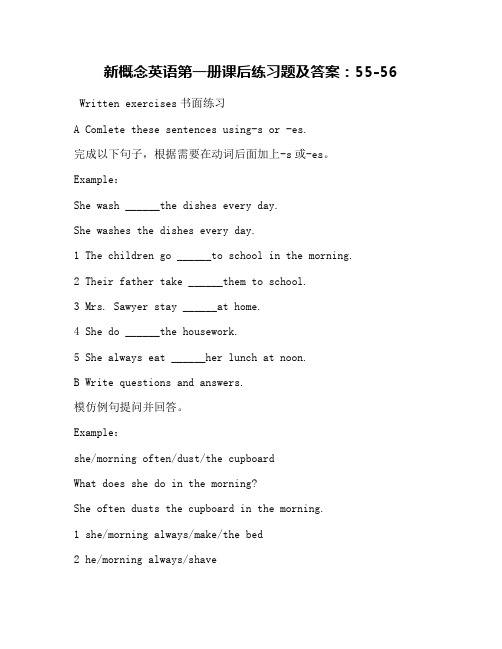
新概念英语第一册课后练习题及答案:55-56 Written exercises书面练习A Comlete these sentences using-s or -es.完成以下句子,根据需要在动词后面加上-s或-es。
Example:She wash ______the dishes every day.She washes the dishes every day.1 The children go ______to school in the morning.2 Their father take ______them to school.3 Mrs. Sawyer stay ______at home.4 She do ______the housework.5 She always eat ______her lunch at noon.B Write questions and answers.模仿例句提问并回答。
Example:she/morning often/dust/the cupboardWhat does she do in the morning?She often dusts the cupboard in the morning.1 she/morning always/make/the bed2 he/morning always/shave3 they/evening sometimes/listen to/the stereo4 he/every day always/clean/the blackboard5 they/night always/go/to bed early6 she/every day usually/wash/the/dishes7 they/afternoon usually/type/some letters8 it/every day usually/drink/some milk9 they/evening sometimes/watch/television10 she/noon always/eat/her lunch11 he/evening often/read/his newspaper答案:Lesson 561 The children go to school in the morning.2 Their father takes them to school.3 Mrs. Sawyer stays at home.4 She does the housework.5 She always eats her lunch at noon.B1 What does she do in the morning? She always makes the bed in the morning.2 What does he do in the morning? He always shaves in the morning.3 What do they do in the evening? They sometimes listen to the stereo in the evening.4 What does he do every day? He always cleans the blackboard every day.5 What do they do at night? They always go to bed early at night.6 What does she do every day? She usually washes the dishes every day.7 What do they do in the afternoon? They usually type some letters in the afternoon.8 What does it do every day? It usually drinks some milk every day.9 What do they do in the evening? They sometimes watch television in the evening.10 What does she do at noon? She always eats her lunch at noon.11 What does he do in the evening? He often reads his newspaper in the evening.。
新概念第一册 Lesson 55-56The Sawyer family (一般现在时)

Grammar: 一般现在时
一般现在时表示经常发生的或习惯性的动作或目前的状态。常与表示频率的时间 状语连用: always, usually, every morning/night/evening/day/week/year, often, etc. 主谓一致: 主语是第三人称单数时, 动词应变成相应的第三人称单数形式。 肯定句:主语+动词+其他
lunch
breakfast /ˈbrekfəst/ n. 早餐 lunch /lʌntʃ/ n. 午饭 dinner /ˈdɪnə(r)/ n. 晚餐
usually frequency word ቤተ መጻሕፍቲ ባይዱ度副词
never 从不 seldom 很少 sometimes有时 often 经常 usually 通常 always 一直
0%
100%
together gather v. 聚集,集合 together /təˈɡeðə(r)/ adv. 一起
Time of the day
noon n. 中午 at noon 在中午
morning 早晨; 上午 in the morning afternoon 下午 in the afternoon
evening 晚上 in the evening
night 夜间 at night
arrive
arrive /əˈraɪv/ v. 到达 (反) leave /liːv/ v. 离开 n. 休假 arrival /əˈraɪvl/ n. 到达 (反) departure /dɪˈpɑːtʃə(r)/ n. 离开,出发
stay stay /steɪ/ v. 呆在,停留 (反) leave /liːv/ v. 离开
2016新概念第一册 Lesson 55-56 课堂及课后练习
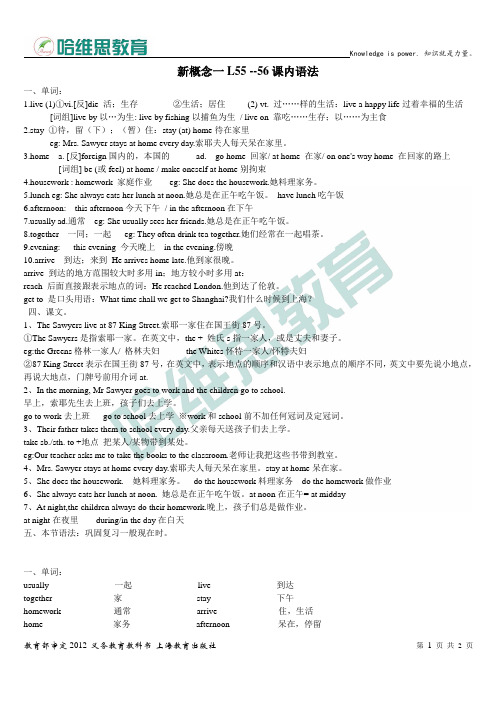
新概念一L55 --56课内语法一、单词:1.live (1)①vi.[反]die 活;生存②生活;居住(2) vt. 过……样的生活:live a happy life过着幸福的生活[词组]live by以…为生: live by fishing以捕鱼为生/ live on 靠吃……生存;以……为主食2.stay ①待,留(下);(暂)住:stay (at) home待在家里eg: Mrs. Sawyer stays at home every day.索耶夫人每天呆在家里。
3.home a. [反]foreign国内的,本国的ad. go home 回家/ at home 在家/ on one's way home 在回家的路上[词组] be (或feel) at home / make oneself at home别拘束4.housework : homework 家庭作业eg: She does the housework.她料理家务。
5.lunch eg: She always eats her lunch at noon.她总是在正午吃午饭。
have lunch吃午饭6.afternoon: this afternoon今天下午/ in the afternoon在下午ually ad.通常eg: She usually sees her friends.她总是在正午吃午饭。
8.together 一同;一起eg: They often drink tea together.她们经常在一起唱茶。
9.evening: this evening 今天晚上in the evening.傍晚10.arrive 到达;来到He arrives home late.他到家很晚。
arrive 到达的地方范围较大时多用in;地方较小时多用at:reach 后面直接跟表示地点的词:He reached London.他到达了伦敦。
新概念英语第一册自学笔记含课后练习答案:Lesson55-56
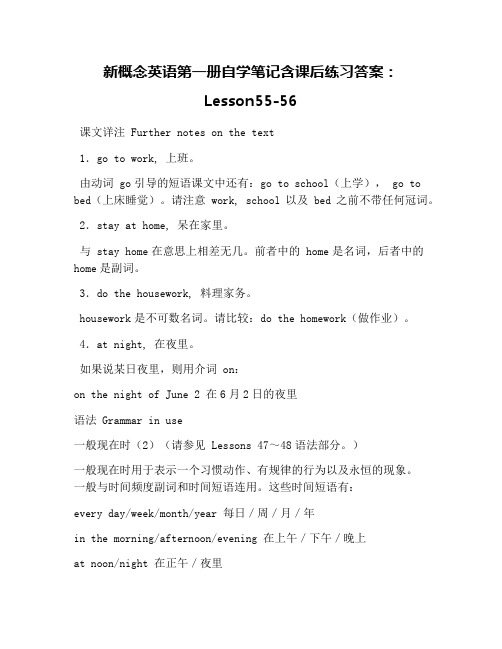
新概念英语第一册自学笔记含课后练习答案:Lesson55-56课文详注 Further notes on the text1.go to work, 上班。
由动词 go引导的短语课文中还有:go to school(上学), go to bed(上床睡觉)。
请注意 work, school以及 bed之前不带任何冠词。
2.stay at home, 呆在家里。
与 stay home在意思上相差无几。
前者中的 home是名词,后者中的home是副词。
3.do the housework, 料理家务。
housework是不可数名词。
请比较:do the homework(做作业)。
4.at night, 在夜里。
如果说某日夜里,则用介词 on:on the night of June 2 在6月2日的夜里语法 Grammar in use一般现在时(2)(请参见 Lessons 47~48语法部分。
)一般现在时用于表示一个习惯动作、有规律的行为以及永恒的现象。
一般与时间频度副词和时间短语连用。
这些时间短语有:every day/week/month/year 每日/周/月/年in the morning/afternoon/evening 在上午/下午/晚上at noon/night 在正午/夜里第3人称单数的谓语动词需加以变位,这可分为几种情况:(1)直接加 -s,如:come----comesarrive----arrives(2)以 -sh, -ch, -o 以及 -s结尾的动词加 -es,如:wash----washesgo----goeswatch----watchesdo----does(3)以辅音加 -y结尾的动词,把 -y改成 -i,再加 -es;而元音加-y结尾的动词,只加 -s即可:hurry----hurriescarry----carriesplay----playsstay----stays词汇学习 Word study1.arrive v.(1)到达;到来:We arrived home early. 我们很早就到家了。
新概念英语第一册Lesson55-56笔记(语法点+配套练习+答案)
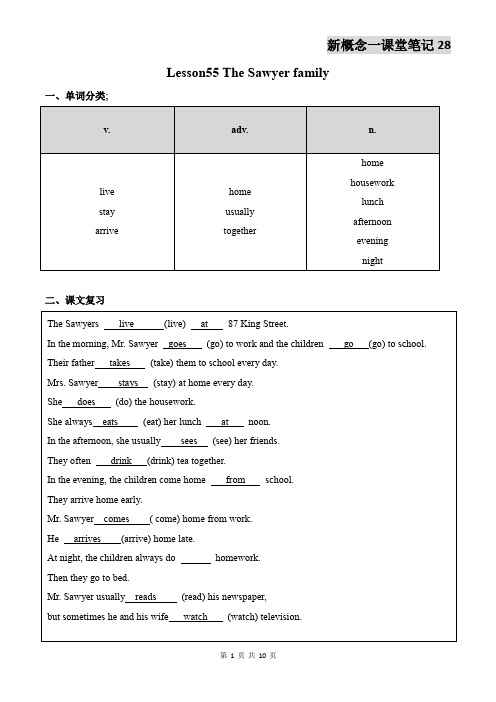
nightn.夜间
atnight在晚上
atnoon在中午
The koala sleepsinthe day and movesatnight.
I don’t go homeatnoon.
The Sawyer family
live at +小地点
living thing生物
living way生活方式
life n.生活,生命
I liveat58 Huanghe Road.
He livesinEngland.
The old man likes livinginthe country.
Different people have their differentliving ways .
The baby like stayingwithits mother.
Get up! Don’t stayinbed.
home
n.家
adv.在家,到家
at home在家
stay at home呆在家
go home回家
arrive home到家
I have a beautifulhomein Zhangzhou.(n.)
看电视
at noon
在中午
make the bed
铺床
in the afternoon
在下午
wash the dishes
刷盘子
at night
在晚上
type a letter
打信
5、语法解析
1.一般现在时
定义:1.(fact)客观事实或客观真理
新概念英语第一册55-56课详解

新概念英语第一册55-56课详解Lesson 55-56 of New Concept English Book 1 Detailed Explanation.Lesson 55: The Sawyer Family.Vocabulary and Expressions:live [lɪv] v.: This verb has multiple meanings. Firstly, it can mean to reside or habitually inhabit a place. For example, "I live in Hefei." Secondly, it can mean to exist or be alive, as in "People cannot live without air." Lastly, it can be used in the expression "live a/an... life" to describe the way someone lives their life.stay [steɪ] v.: This Verb primarily means to remain in a place for a period of time. It can also be used figuratively to mean "remain" in a certain state or condition, as in "stay hungry, stay foolish."home [həʊm] n./adv.: As a noun, it refers to the place where one lives. As an adverb, it means "to the place where one lives," as in "go home."housework ['haʊswɜːk] n.: This noun refers to the tasks related to maintaining a household, such as cleaning, cooking, and laundry.lunch [lʌnʃ] n.: This noun refers to the meal eaten in the middle of the day.afternoon [ɑːftə'nuːn] n.: This noun refers to the period of time between noon and evening.Text Explanation:Lesson 55 introduces the Sawyer family and their daily routine. The lesson begins by introducing the family members and their occupations. Mr. Sawyer works in an office, while Mrs. Sawyer stays at home. The children go to school. The lesson then goes on to describe their eveningactivities. Mr. Sawyer usually arrives home from work at about five o'clock, and the family then has their lunch together. In the afternoon, they often have a rest, andthen in the evening, they usually stay at home and watch television.Grammar Points:The use of "-s" or "-es" to form the third-person singular present tense of verbs is reinforced in this lesson. For example, "Mr. Sawyer usually arrives home from work at about five o'clock."The use of prepositions with "live" is also introduced. For example, "Mr. Sawyer lives in a town near London,"where "in" is used with a large place, and "Mrs. Sawyerlives at 87 King Street," where "at" is used with aspecific address.Lesson 56: What Do They Do?Vocabulary and Expressions:together [tə'geðə] adv.: This adverb means "in a group" or "side by side."evening ['iːvnɪŋ] n.: This noun refers to the time of day that comes after afternoon and before night.arrive [ə'raɪv] v.: This Verb means to reach a destination after a journey.night [naɪt] n.: This noun refers to the period of time from sunset to sunrise.Text Explanation:Lesson 56 continues the theme of the Sawyer family's daily life by asking the question, "What do they do?" The lesson provides information about the family's evening activities. Mr. Sawyer usually arrives home from work at about five o'clock, and then the family has their tea together. After tea, they usually sit in the living room and watch television. Sometimes, they go to the cinema orto the theater. On Sundays, they often go for a walk in the park.Grammar Points:The present tense of verbs is reinforced in this lesson, particularly the use of the third-person singular form.The lesson also introduces the use of modal verbs such as "can" and "usually" to express ability and frequency.Conclusion:Lessons 55 and 56 of New Concept English Book 1 focus on the Sawyer family's daily routine and activities. These lessons introduce new vocabulary and expressions related to family life, daily activities, and grammar points such as the use of "-s" or "-es" in the third-person singular present tense and the use of modal verbs. By learning these lessons, students can improve their understanding of family life in English-speaking countries and enhance theirlanguage skills in areas such as vocabulary, grammar, and comprehension.。
新概念英语第一册lesson55-56

v. v. n. ad. n. n. n. adv. adv. n. v. n.
住,生活 呆在,停留 家;在家,到家 家务 午饭 下午 通常 一起 晚上 到达 夜晚
1234. TIMnhrteshi.SreSfamawwtohyyrenerirsntasglkit,vaeMeyssrat.thaS8tea7mhwoKytmoienersggceShvoteorresoyelttode.vawey.oryrkday. and the children go to school.
3.傍晚,孩子们放学回家。他们到家 很早。索耶先生下班回家。 他到家很 晚。
4. Mr. Sawyer comes home from work. He 4.晚上,孩子们总是做作业, 然后
arrives home late. At night, the children
去睡觉。索耶先生总是读报纸,但有
5678. ISTnhtehyedaoloawfefttaeseynrtsnhdoeroaihntnosk,uhstseheearewtluoosngrukcea.hthllaeytrs.neoeosnh. er friends.
911.20I.nMHTtherh.eeaSyrearavwirveryenivesiernhgchoo,omtmmheeeslacehtaeoir.lldmyr.enfrcoommweohrokm. e from school.
课文全景图
实现背诵图
一、单词重点
★ live v. 住,生活
People can’t live without air and water. (谚) Live and learn. 活到老,学到老。
新概念英语第一册第55-56课-The Sawyer family
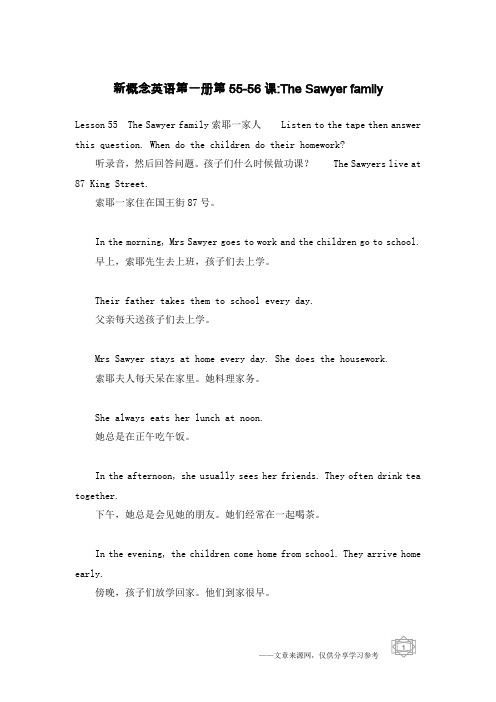
新概念英语第一册第55-56课:The Sawyer familyLesson 55 The Sawyer family索耶一家人Listen to the tape then answer this question. When do the children do their homework?听录音,然后回答问题。
孩子们什么时候做功课?The Sawyers live at 87 King Street.索耶一家住在国王街87号。
In the morning, Mrs Sawyer goes to work and the children go to school.早上,索耶先生去上班,孩子们去上学。
Their father takes them to school every day.父亲每天送孩子们去上学。
Mrs Sawyer stays at home every day. She does the housework.索耶夫人每天呆在家里。
她料理家务。
She always eats her lunch at noon.她总是在正午吃午饭。
In the afternoon, she usually sees her friends. They often drink tea together.下午,她总是会见她的朋友。
她们经常在一起喝茶。
In the evening, the children come home from school. They arrive home early.傍晚,孩子们放学回家。
他们到家很早。
Mr Sawyer comes home from work. He arrives home late.索耶先生下班回家。
他到家很晚。
At night, the children always do their homework. Then they go to bed.晚上,孩子们总是做作业,然后去睡觉。
新概念英语一册55-56课练习

一.根据所给中文意思补全单词。
1.l__v__ (住,生活)2.st__ __ (呆在,停留)3.h__m__ (家,在家)4.h__ __sew__ __k (家务)5.l__ __ch (午饭)6.a__t__ __n__ __n (下午)7.u__u__ll__ (通常)8.t__g__th__ __ (一起)9.ev__n__ __ __ (晚上)10.__rr__v__ (到达)11.n__ __ __t (夜间)二.用所给词的适当形式填空1. She usually __________her lunch at school. (eat)2. We ____________an English test every week. (have)3. What are you ____________tomorrow? (do)4. Look, the boy _____________on the road. (cry)5. My father _____________very hard. (work)6. Linda always ___________at home on Sundays. (stay)7. The sun _____________in the east. (rise)8. They often ___________kites in spring. (fly)9. It's six o'clock. My mother _____________. (cook)10. Mr. Sawyer sometimes _____________his newspaper at night. (read)11. The Sawyers ______ at 87 King Street. (live)12. Mr. Sawyer ______ to work in the morning. (go)13. We are from Germany, but Dimitri ______ from Greece. (come)14. The father ______ his children to school now. (take)15. Mrs. Smith ______ at home every day. (stay)16. The girl can ______ the vase on this table. (put)17. Mr. Sawyer usually ______ his newspaper at night. (read)18. We are going ______ the flowers to the teacher. (send)19. I can’t go now. I must ______ my homework. (do)20. Look, they ______ (work) hard.三.单项选择。
新概念英语一册55-56课习题

Lesson 55-56 The Sawyer family 索耶一家人基础达标一单词拼写1.生活 ________________________2.家务_________________________3.一起 ________________________4.到达_________________________5.时常 ________________________6.停留_________________________7.午饭 ________________________8.夜间_________________________9.下午 ________________________ 10.一直,总是__________________二选择( )1. He ______to do his lessons at eight every evening.A. is beginningB. beginsC. begin( )2. He usually _______TV on Sunday evening.A. watchB. watchingC. watches( )3. ----Do you know Susan’s address?----Yes. She lives ____201 , Dongchang Road ,Liaocheng City.A. inB. atC. on( )4. My brother _____ a lot. He is reading a new magazine now.A . reads B. read C. has read( )5. They usually have a football match ___Friday.A. inB. onC. to( )6. He went there ______, not ______.A. on the car/by carB. on foot/ by carC. in his car/by his foot ( )7. I _____to the cinema . I _____there every Sunday.A. go/goB.am going/goC. go/am going( )8.My father _____his clothes---he is repairing his car.A. doesn’t washB. isn’t washingC. isn’t washes.( )9. The Lees _____next to me. They are my neighbours.A. livesB. liveC. is living( )10. ----When do you usually arrive ____the morning? ----At about 7:45.A. onB. inC. at( )11.I live _____my grandparents. Now we are having dinner _____at home.A. together/withB. with/togetherC. at/with( )12.____you _____your homework now?A. Do/doingB. Are/doingC. Were/doing( )13. ---______is your grandpa .Emma? ---He is watering the flowers in the garden.A. WhenB. WhereC. What( )14. Lucy is very free. Look, she ____a model ship.A. makesB. is makingC. has made( )15. The fifth month of the tear is _____.A. FebruaryB. MayC. April能力提升三阅读Now TV programs play an important part in our daily life. We can get a lot of knowledge and a lot of fun from it.Today is Saturday. The following are some TV programs on different channels today. Now read these TV programs and try to find some information for you and your family members.SXTV Channel 7 13:12 Football MatchXATV Channel 4 15:30 TV PlaySXTV Channel 6 18:30 Cartoon FilmCCTV Channel 1 12:38 Law TodayCCTV Channel 1 19:00 News ReportCCTV Channel 3 21:00 The Latest Music( ) 1.My grandfather is interested in laws. He can watch CCTV Channel 1 at noon.( )2. My father is a football fan. He prefers football matches .He can watch CCTV Channel 1. ( )3. My mother likes watching TV plays. She wants to watch XATV Channel 4 in the afternoon. ( ) 4. My sister is only six years old. I want to find a program for her. I think she can watch CCTV Channel 6.( ) 5. I am a student. I like music. So I can watch CCTV Channel 3 this evening.四连词成句1. housewife, a ,Mrs.Johnson , is_________________________________________________2. sometimes , she , the stereo, to, the , in , evening_________________________________________________3. night , at, always, to, goes, she , bed, late_________________________________________________4. types, letters, some, afternoon, the, in, she, usually_________________________________________________5.does , usually, the, in, housework, morning, the ,she,_________________________________________________五翻译1.索伊一家住在国王街87号。
(完整版)新概念英语一册55-56课练习

(完整版)新概念英语一册55-56课练习一.根据所给中文意思补全单词。
1.l__v__ (住,生活)2.st__ __ (呆在,停留)3.h__m__ (家,在家)4.h__ __sew__ __k (家务)5.l__ __ch (午饭)6.a__t__ __n__ __n (下午)7.u__u__ll__ (通常)8.t__g__th__ __ (一起)9.ev__n__ __ __ (晚上)10.__rr__v__ (到达)11.n__ __ __t (夜间)二.用所给词的适当形式填空1. She usually __________her lunch at school. (eat)2. We ____________an English test every week. (have)3. What are you ____________tomorrow? (do)4. Look, the boy _____________on the road. (cry)5. My father _____________very hard. (work)6. Linda always ___________at home on Sundays. (stay)7. The sun _____________in the east. (rise)8. They often ___________kites in spring. (fly)9. It's six o'clock. My mother _____________. (cook)10. Mr. Sawyer sometimes _____________his newspaper at night. (read)11. The Sawyers ______ at 87 King Street. (live)12. Mr. Sawyer ______ to work in the morning. (go)13. We are from Germany, but Dimitri ______ from Greece. (come)14. The father ______ his children to school now. (take)15. Mrs. Smith ______ at home every day. (stay)16. The girl can ______ the vase on this table. (put)17. Mr. Sawyer usually ______ his newspaper at night. (read)18. We are going ______ the flowers to the teacher. (send)19. I can’t go now. I must ______ my homework. (do)20. Look, they ______ (work) hard.三.单项选择。
新概念一册lesson_55-56
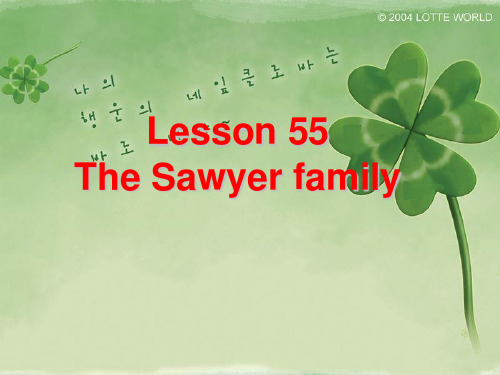
Lesson 56 What do they usually do?
一般现在时
主语
第三人称复数
谓语
动词原形:do
The Sawyers live at 87 King Street. The children go to school. They often drink tea together. The children come home from school. They arrive home early. The children always do their homework. They go to bed. He and his wife watch television.
afternoon 下午
noon 中午,正午 = midday at noon = at midday 在正午 in the morning in the afternoon in the evening at night/noon I often watch TV at night.
usually adv.通常
指经常发生的,习惯性的动作,一般与 一般现在时连用。
I usually go to work by bus. I usually don’t eat breakfast. -What do you usually do in the afternoon/at night? -I usually play computer. 我通常都中午才起床。
clean the floor / wash the dishes cook dinner Do you often do housework at home? lunch 午饭 breakfast supper dinner(较正式,一般指晚宴) meal [mi:l] 餐 have a big meal
新概念一册lesson55-56练习题
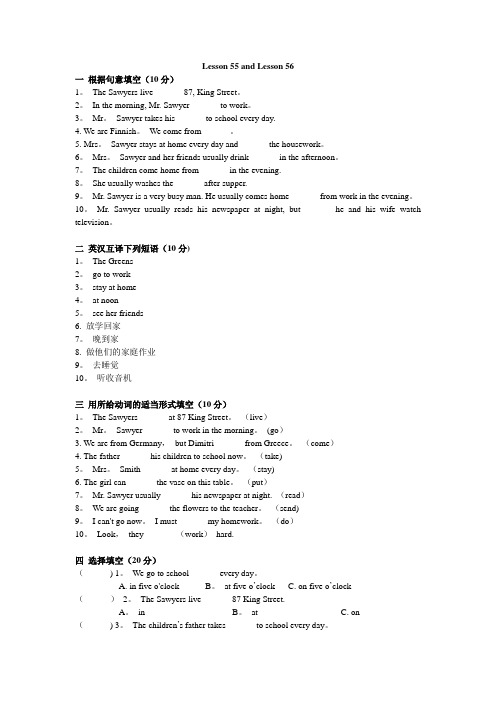
Lesson 55 and Lesson 56一根据句意填空(10分)1。
The Sawyers live ______ 87, King Street。
2。
In the morning, Mr. Sawyer ______ to work。
3。
Mr。
Sawyer takes his ______ to school every day.4. We are Finnish。
We come from ______。
5. Mrs。
Sawyer stays at home every day and ______ the housework。
6。
Mrs。
Sawyer and her friends usually drink ______ in the afternoon。
7。
The children come home from ______ in the evening.8。
She usually washes the ______ after supper.9。
Mr. Sawyer is a very busy man. He usually comes home ______ from work in the evening。
10。
Mr. Sawyer usually reads his newspaper at night, but ______ he and his wife watch television。
二英汉互译下列短语(10分)1。
The Greens ______2。
go to work ______3。
stay at home ______4。
at noon ______5。
see her friends ______6. 放学回家______7。
晚到家______8. 做他们的家庭作业______9。
去睡觉______10。
听收音机______三用所给动词的适当形式填空(10分)1。
- 1、下载文档前请自行甄别文档内容的完整性,平台不提供额外的编辑、内容补充、找答案等附加服务。
- 2、"仅部分预览"的文档,不可在线预览部分如存在完整性等问题,可反馈申请退款(可完整预览的文档不适用该条件!)。
- 3、如文档侵犯您的权益,请联系客服反馈,我们会尽快为您处理(人工客服工作时间:9:00-18:30)。
新概念英语第一册课后习题及答案:Lesson55-56 Written exercises书面练习
A Comlete these sentences using-s or -es.
完成以下句子,根据需要在动词后面加上-s或-es。
Example:
She wash ______the dishes every day.
She washes the dishes every day.
1 The children go ______to school in the morning.
2 Their father take ______them to school.
3 Mrs. Sawyer stay ______at home.
4 She do ______the housework.
5 She always eat ______her lunch at noon.
B Write questions and answers.
模仿例句提问并回答。
Example:
she/morning often/dust/the cupboard
What does she do in the morning?
She often dusts the cupboard in the morning.
1 she/morning always/make/the bed
2 he/morning always/shave
3 they/evening sometimes/listen to/the stereo
4 he/every day always/clean/the blackboard
5 they/night always/go/to bed early
6 she/every day usually/wash/the/dishes
7 they/afternoon usually/type/some letters
8 it/every day usually/drink/some milk
9 they/evening sometimes/watch/television
10 she/noon always/eat/her lunch
11 he/evening often/read/his newspaper
答案:
Lesson 56
A
1 The children go to school in the morning.
2 Their father takes them to school.
3 Mrs. Sawyer stays at home.
4 She does the housework.
5 She always eats her lunch at noon.B
1 What does she do in the morning? She always makes the bed in the morning.
2 What does he do in the morning? He always shaves in the morning.
3 What do they do in the evening? They sometimes listen to the stereo in the evening.
4 What does he do every day? He always cleans the blackboard every day.
5 What do they do at night? They always go to bed early at night.
6 What does she do every day? She usually washes the dishes every day.
7 What do they do in the afternoon? They usually type some letters in the afternoon.
8 What does it do every day? It usually drinks some milk every day.
9 What do they do in the evening? They sometimes watch television in the evening.
10 What does she do at noon? She always eats her lunch at noon.
11 What does he do in the evening? He often reads his newspaper in the evening.。
